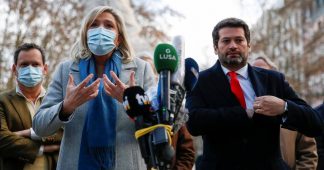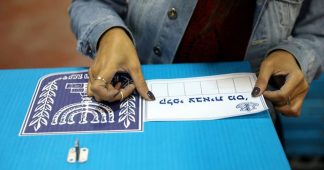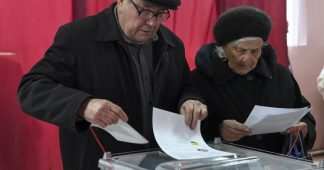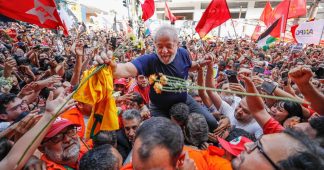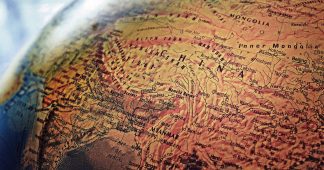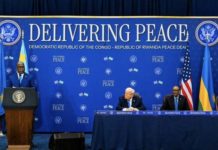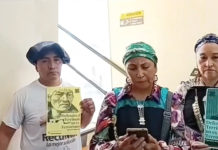26 January 2021
The Central Committee of the PCP analysed the results of the January 24 elections for President of the Republic and the resulting political framework. It assessed the situation of the Covid-19 epidemic in the country and the responses that are needed. It outlined the main lines of intervention of the Party, in which the response to the national situation, the strengthening of the Party and the celebrations of its Centennial stand out.
I – The elections for President of the Republic
1. Marcelo Rebelo de Sousa’s re-election in the first round with 60.7% reflects the expected result of an elaborate promotion of this candidate, who, in addition to the unique advantage resulting from the exercise of presidential duties, benefited from the fabrication of an apparent unanimity.
One cannot fail to point out the attitude assumed by the candidate Marcelo Rebelo de Sousa in the devaluation of these elections, particularly visible in the ostensible non-utilization of the means of clarification available, supported by a rehearsed austere stance regarding campaign means and resources, also contributing to a lesser electoral mobilisation.
The Central Committee of the PCP alerts to the real possibility of, besides words, the now re-elected President of the Republic exercising a second term with an even more explicit alignment with the objectives, interests and agenda of the right-wing policy, which has never ceased to be present in the important decisions taken in the exercise of his duties. A position all the more likely as is common knowledge, and the PCP has pointed out, his commitment to the process of rearrangement of political forces set in motion to whitewash the PSD and its responsibilities, rehabilitate it politically and bring it back to power, accompanied or not by reactionary surrogates, or a role of intense cooperation with the PS, seeking to ensure the conditions for the restoration of the «central bloc», formally or informally assumed. In this sense, the Central Committee of the PCP cannot fail to underline the significance translated by the support of sectors of the PS to the candidacy of Marcelo Rebelo de Sousa.
The Central Committee of the PCP reaffirms that the President of the Republic is responsible for upholding, complying and enforcing the Constitution of the Portuguese Republic, and not encouraging its subversion. This is the demand placed on the President-elect.
2. The Central Committee of the PCP stresses the value and significance of João Ferreira’s candidacy, which, like no other, placed the value of work and workers, public services, freedom and democracy at the centre of his intervention, and gave content and meaning to what the Constitution of the Republic represents as a reference for an alternative patriotic and left-wing policy, of social progress, of guaranteeing and enforcing rights, of affirming Portugal as a developed and sovereign nation.
The candidacy that affirmed the April Values embodied in the Constitution of the Republic as solutions to the structural problems of the country, that assumed the denunciation of injustices, exploitation and class options that are at the root of the favouring of the great economic and financial groups, that denounced the various aspects of the attack on the democratic regime promoted by the most reactionary sectors of Portuguese society and that, frontally, pointed out the omissions and wrong options of the current President of the Republic. A candidacy that affirmed sovereignty and national interests, inseparable from the country’s right to its development. A candidacy that, against the flow of the media, did not allow itself to be dragged into the quagmire of a campaign based on cases and insults and that always maintained elevation in the political debate, focusing on what was at stake in these elections, in the functions of the President of the Republic, with the strength of clarity, serenity, rigour, conviction, courage and confidence.
3. The votes obtained by João Ferreira, although below the amount that the candidacy merited, shows an electoral advance when compared to the result of the candidate supported by the PCP in 2016. In fact, the increase from 3.95% to 4.32% and obtaining an identical number of votes, in a context with almost half a million less voters, refutes those who falsely seek to belittle the result obtained by the candidacy. A result built in a context marked by public health circumstances that limited the breadth and scope of the action of clarification and mobilisation and in which adverse features in ideological terms continued and despite the handling of the campaign by the media. A result that took place in the context of the prevalence of dispersive factors, both on the importance of the elections and on what was actually decided by them, with the promotion given to secondary aspects to the detriment of those substantial.
We underline the support of voters who had never before endorsed a candidate proposed by the PCP. At the same time, there was the pressure, in view of the dramatization of the possibility of a second round, to shift votes in favour of Marcelo Rebelo de Sousa’s candidacy, as well as for Ana Gomes, given the disproportionate emphasis given to false disputes over second place.
Among other factors, the more significant abstention among specific sections of the population due to the epidemiological situation may have also weighed, and the factors of highlighting the fears of exercising the right to vote that marked the last weeks.
The Central Committee of the PCP salutes the members of the PCP and JCP, the members of the Ecologist Party “The Greens” (PEV) and ID, the democrats and patriots who contributed to the affirmation of this candidacy.
The Central Committee of the PCP, saluting all those who expressed their support for João Ferreira’s candidacy, reaffirms that this support and force will be placed at the service of the intervention and struggle for an alternative policy capable of ensuring the improvement of workers’ and peoples’ living conditions, for progress and social justice and the development of the country.
4.The high abstention that took place, finding in the epidemic an added factor, further compounded by the enhancement of fear and insecurity that was promoted and spread, is also not separable from the downplay to which these elections were subjected and from the expression of signs of abandonment and disinterest, already present in other elections, that the lack of response to the problems of the country and the lives of workers and people have been adding and that reactionary sectors intend to use as instruments to attack democracy itself.
The Central Committee of the PCP stresses that the candidates who embodied the most reactionary expressions associated with the interests of big capital – André Ventura and Tiago Mayan – have a result that is inseparable, but even so they fall short of the deliberate promotion and emphasis that some wanted to attribute to them to divert focus and priorities on the value and significance of the candidacies present. In addition to the many who, although not sharing reactionary concepts, allowed themselves be instrumentalized by a demagogic discourse, the electoral expression of these candidates is far from fulfilling the one that, in other times, reactionary candidates obtained.
The result obtained by Ana Gomes – 12.97% -, although benefiting from an artificial and shrewd bipolarization that they tried to spread, reveals the difficulties of affirming her candidacy, even among the electoral base of the party to which she belongs. The candidate supported by the Left Bloc, Marisa Matias, registered a 3.95% vote, representing a significant drop when compared to the 10.13% obtained in the last elections for President of the Republic.
The Central Committee of the PCP highlights the civic example of the thousands of polling station members, delegates and workers who ensured that the elections were held in conditions of security.
Without prejudice to the high levels of abstention, the elections refuted and undercut the manoeuvres and projects of those who, under the pretext of the epidemic and a false call to public health, wanted to impose a situation of exception, postpone the elections, change the electoral laws and review the Constitution of the Republic.
II – The current situation and the political framework
1. The national situation, marked by the worsening of the epidemic, as well as by the deterioration of the economic and social situation, confirms the necessary and urgent response to the problems facing the country. The most recent evolution of the epidemic and the problems and concerns it raises, the use that is being made of it to impose an agenda of limitation of rights and social regression, its instrumentalization to feed reactionary agendas and justify anti-democratic projects aimed at the Constitution of the Republic, do not find the answers and measures needed by the situation in the PS government. A fact that, in itself, encourages retrograde PSD and CDS projects and their reactionary surrogates to seek to question the National Health Service and public services in general, workers’ rights, the exercise of rights, freedoms and guarantees.
The situation calls for a patriotic and left-wing policy, a determined policy of valuing wages and workers’ rights, protecting employment and working conditions, effective support for micro and small companies, namely small businesses and the hospitality sector, grappling with the abrupt drop in activity, the answer to the difficulties in which workers and cultural agents are immersed. The recent serious developments at TAP, at the GALP refinery in Matosinhos or at EDP’s Thermoelectric Power Station in Sines, with the destruction of jobs, companies and installed production capacity, place on the agenda the demand for State intervention to assert the defence of national interests.
At a time when limitations to activity are renewed, resulting from new lockdowns and the interruption of school activities, the mobilisation of means and resources surfaces with particular acuity. Support, social protection and the safeguarding of 100% pay are needed for the workers, the rights of those in teleworking, including family assistance. It is necessary to respond to the future of thousands of small companies, together with a determined public investment capable of contributing to the economic growth.
2. The evolution of the epidemiological situation, and the use that big capital makes of it, poses a very significant set of health, economic and social problems of unquestionable seriousness.
The Central Committee of the PCP reinforces that Portugal needs measures for the prevention and containment of the virus and points out reservations that led to distancing itself from the State of Emergency, which more than responding to the epidemic has served to justify restrictions on rights, the activity thousands of micro, small and medium-sized enterprises and the destruction of the associative, cultural and sporting fabric.
It also stresses the urgency of measures that include the rapid strengthening of the public health structure, including the improvement of testing and screening capacity, for ensuring health protection in the workplaces and in transportation of all those who have to leave their homes every day. to ensure essential services and maintain economic activity; the pedagogy on protection regarding the norms defined by the National Health Authority and the reinforcement of the NHS with professional and technical means, which enables to respond to the significant increase in the number of hospitalized patients with COVID-19 and to all other patients with other diseases.
One of the greatest constraints to the activity of the NHS is the lack of doctors of the various specialisations, nurses, technicians and other health professionals. Although not a measure with immediate effects, the increase in the number of doctors, in initial training and specialisation, is decisive and urgent, as is the training of nurses, technicians and other health professionals to guarantee the provision of care in the public service. As well as implementing a determined policy of valuing these professionals, both in terms of wages and careers.
The Central Committee of the PCP draws attention to the fact that the difficulties experienced daily in the NHS units, a situation that has been used to intensify the discourse of alarm and fear, being the result of the worsening of the epidemiological situation, with the exponential increase in the number of cases and the number of hospitalisations witnessed in the last two weeks, is mainly due to the fact that for more than 30 successive years governments have undertaken a strategy to reduce the capacity of the public health service, with emphasis on the closure of thousands of beds and reducing the number of professionals. Those who now demonize the NHS are the same ones who, for years, conditioned the constitutional right to healthcare to the interests of economic groups in the disease business and to the impositions of the European Union and the Euro, weakening it with the aim of its destruction.
The Central Committee of the PCP considers that the Government has at its disposal the legal instruments that make it possible to mobilise all the means available in the country to fight the epidemic. It must do so within a framework of a single, cohesive and centralised management of resources by the NHS, and not by enhancing the disease business.
The Central Committee of the PCP stresses the importance of the vaccination process to proceed as quickly and safely as possible. A process that requires the country not to be dependent solely on decisions by the European Commission on global purchases from pharmaceutical companies that, in addition, continue to show difficulties in production and distribution. The situation requires the country to assume the sovereign option of diversifying the purchase of vaccines approved by the World Health Organization from other pharmaceutical companies, as well as the possibility of agreements that involve the national production of these vaccines.
3. The priorities and programme for the Portuguese Presidency of the Council of the European Union show the alignment of the Portuguese government with the guidelines and policies of the European Union, determined by the interests of the great powers and their large economic and financial groups.
The inauguration of the new American administration, headed by Joe Biden, in addition to the announced changes in the domestic area, is accompanied by the attempt to rehabilitate the image of the USA, seeking to portray as a an example of democracy a system dominated by financial capital and by the military-industrial complex, whitewashing its role as the hegemonic power of the imperialist camp.
The Biden administration seeks to settle cleavages within the US ruling class, in order to try to mitigate the persistent and deep problems and fractures that mark American society and, thus, try to counter its relative decline on the world stage. Likewise, it announces the aim of mitigating contradictions with other major capitalist powers in order to align them in its strategy of confrontation, interference and aggression, trying to salvage its world domination.
In view of imperialism’s aggressive policy, we reaffirm the need to reinforce internationalist solidarity and convergence in a broad anti-imperialist front that restrains imperialism’s offensive and paves the way to the construction of a new international order of peace, sovereignty and social progress.
III – The mass struggle and its development
The Central Committee of the PCP salutes the struggle of the workers and populations and stresses the importance of its dynamization and expansion.
The struggle, which will necessarily continue with the claiming action in workplaces, companies and sectors, is of the utmost importance for workers’ rights and living conditions. A struggle that is developing for the general increase in wages for all workers, following the increase of the national minimum wage by 30 euros, which, although insufficient, is a progress that is already taking place as of January; combating the deregulation of working hours and reducing them; combating precariousness; guaranteeing better working conditions and health protection; revoking the grievous rules of labour legislation, namely the caducity of collective bargaining; and restoring the principle of more favourable treatment to workers.
The struggle of MSMEs for support and measures indispensable to their activity, the action of the sector of culture, the struggle of the retired and pensioners for the materialisation of their rights, for decent living conditions, are all very topical.
The fight for the defence and reinforcement of public services, with emphasis on the NHS, constitutes a general and central objective that is placed on the Portuguese people in the current situation.
The Central Committee of the PCP underlines the importance of exercising the rights of trade union organisation and activity and highlights, among the struggles in the near future, the significance of the struggles in the workplaces and companies, and the day of decentralized national struggle, with strikes, stoppages and other actions in the various sectors and regions, called by CGTP-IN for 25 February.
It also highlights the actions of March 8, International Women’s Day, namely the women’s national demonstration promoted by MDM – on March 7 in Porto and March 13 in Lisbon – and the Week for Equality promoted by CGTP-IN, the struggle of working youth on March 25 called by Interjovem/CGTP-IN, the celebrations of the 47th. anniversary of 25th. April, including the 45th. anniversary of the Constitution of the Portuguese Republic on April 2, and the May Day struggle.
IV – The intervention and strengthening of the Party
The intervention and strengthening of the PCP to assert and defend rights and respond to problems with the policy and measures that are required, as well as the struggle of the workers and populations, are the central questions facing the Party.
The complexity of the situation in the country and the world requires Party organisations to undertake careful and bold planning to intervene and respond to the various problems of the workers and people.
Thus, the Central Committee of the PCP points out: the implementation of initiatives on national production; the implementation of a decentralised national action in defence of the NHS, on February 18; carrying out a contact and clarification action with the workers and populations; initiatives on housing during the first half of the year; the preparation of the 45th. Avante! Festival; the development of the preparatory work for municipal elections, under the terms assumed by the Central Committee on December 12, which is now entering a decisive stage of planning and public projection
Among the priorities pointed out are the celebrations of the PCP’s Centennial and the strengthening of the Party.
The Central Committee of the PCP underlines the importance of the celebrations of PCP’s Centennial to highlight the communist ideal and project in a broad, diversified and mass-impacting manner, affirming the motto “Freedom, democracy, socialism – the future has a Party”. The celebrations programme will have a high point on March 6, namely with the rally to be held at Campo Pequeno, in Lisbon, but it also has a line of public affirmation that includes contact actions, painting of murals and other visual propaganda in the main cities of the country, in addition to the ongoing programme of exhibitions and debates. The importance of the book “100 years of struggle at the service of the People and the Homeland, for Democracy and Socialism”, to be launched on February 4, as well as the meeting “The Communists and the Trade Union Movement”, on February 6, both in Lisbon.
In view of the epidemic and the campaign of fear that is underway, respecting and applying health protection measures, it is necessary to work to ensure the functioning of the leadership bodies, Party bodies in general, and to ensure political intervention among the workers and populations.
It is necessary to move forward in strengthening the Party, namely: by strengthening the leadership work, the survey, accountability and training of cadres; the priority of working with the working class and workers, in companies and workplaces, centred on the objective of 100 new leaders entrusted with responsibilities, 100 new company, workplace and sector cells by the end of March, alongside the dynamization of the intervention of existing ones; by strengthening local organisations, by entrusting responsibilities to cadres and the dynamization of intervention with a content centred on the problems of the populations; by recruiting new militants; by working with specific strata and social sectors, in the area of culture, MSMEs and youth, supporting JCP and the holding of its 12th. Congress, on May 15 and 16; by the propaganda and dissemination structures of the party press, namely with the dissemination and sale of Avante! which marks its 90th. anniversary on February 15; by guaranteeing the financial means for the Party’s activity, boosting the National Funding Campaign “The future has a Party” and promoting the update of dues by the Centennial; by holding assemblies of party organisations.
***
The Central Committee of the PCP calls on Party militants and organisations to, within the framework of the conclusions of the XXI Congress, confidently carry out their action in defence of the workers and people, for freedom, democracy and socialism.
Published at www.pcp.pt

